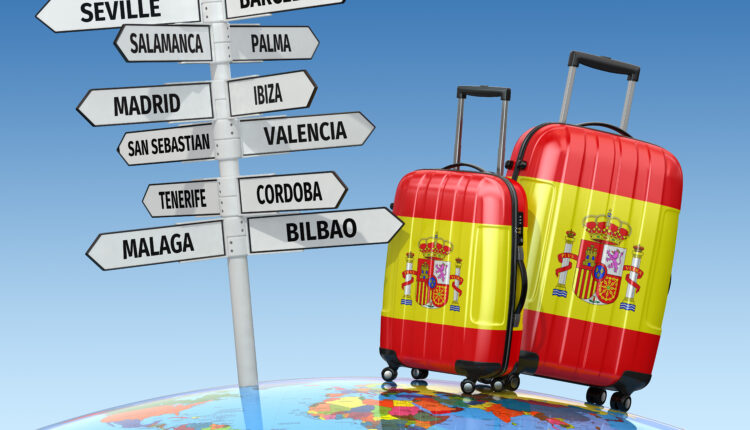Do I need a visa for Spain? Heres the visa policy

There are numerous reasons why millions of travelers from around the world visit Spain every year. From exploring the country’s unique culture and heritage to extravagant weddings, normal business meetings, traditional vacations, and virtually every reason in-between.
If you’re considering traveling to Spain for any reason, especially if it’s your first time, you are probably wondering about the Spain visa requirements. Even if it’s your 50th trip to the country, when it comes to international travel, it’s always best to review the current policies to ensure there aren’t any issues when you apply. Or even worse, once you arrive.
A New Requirement for Traveling to Spain
Due to the ongoing pandemic, as of June 7, 2021, everyone traveling to Spain from outside of the country must complete the Health Control Form and obtain their QR code. This includes international transits and is required of everyone regardless of their nationality, age, or any other consideration. The QR code is required to be presented at both the time of boarding and on arrival in Spain.
Additionally, as of September 6th, in addition to the required QR, United States citizens, as well as U.S. Green card or visa holders, must provide a vaccination card accepted by the Spanish Health Ministry. It is important to note the Spain Health Form for British Citizens is also mandatory for entry.
With That Out of the Way
Hopefully, when it’s time for you to travel to Spain the requirements above will be lifted. However, there will likely always be visa requirements for Spain with a few exceptions.
You need to know how to apply, the policies and requirements, and even the different types of visas and which one you need. This typically depends on your nationality, your reason for visiting, and how long you plan to stay.
Tourist Visa For Spain
Generally, citizens from Australia, Argentina, Brazil, Canada, Japan, New Zealand, and the United States can enter Spain for tourism without a visa for up to 90 days but again, you’ll want to check on any current restrictions with the pandemic.
If you’re not from one of the exempt countries, you have to have a visa to enter Spain for tourism. To apply for a tourist visa, you’ll be required to
complete an application as well as the following:
- Provide two recent passport quality photos that clearly show your face
- A copy of your passport (must be valid for at least 3 months from the date you state you are leaving and it must have two blank pages at a minimum)
- A copy of and visas you’ve previously held
Other documentation you may have to provide, include:
- Flight reservation
- Proof of civil status (marriage certificate, birth certificate of children)
- Hotel reservation
- A cover letter with your itinerary and the purpose of the visit
- Spain Travel Insurance
- A copy of your return ticket
- Other documentation as requested
Spain is a tourist hot spot for numerous reasons and getting your visa might seem like a long process, but it is actually quite simple. You just have to ensure that you fill out the application completely and honestly and ensure that you provide all necessary documentation.
Other Visas for Spain
Alternatively, if you’re not a tourist and you plan to enter the country for another reason, you’ll have to apply for the appropriate corresponding visa.
- Schengen Visa – This visa allows qualified travelers to travel for up to 90 days for tourism or business purposes to any country in the Schengen Area. It is the largest free travel area in the world and the Schengen Visa is valid for most of the European countries.That means that this visa offers access to Spain as well as the other 26 countries in the Schengen This includes travelers to and from Austria, Switzerland, Belgium, Sweden, Czech Republic, Spain, Denmark, Slovenia, Estonia, Slovakia, Finland, Portugal, France, Poland, Germany, Norway, Greece, Netherlands, Hungary, Malta, Iceland, Luxembourg, Italy, Lithuania, Latvia, and Liechtenstein.
- Students – If you’re a non-EU student, to take an educational course in Spain, you’ll need to apply for a Study Visa. Before you can even apply, you have to find and be accepted for the desired course. Generally, a Study Visa is valid for the duration of the course and you have to reapply for additional courses. Additionally, the Study Visa allows you to work for up to 20 hours a week.
- Workers – Unless you are from an EU country, you must have a Spanish Work Visa. Depending on your work requirements, there are several different Spanish Work Visas, such as the Seasonal Work Visa, Au Pair Visas, Long-Term Work Visas, and the EU Blue Card.
- Movers – For those wishing to move to Spain, you’ll need a Residence Visa. You’ll have to submit your visa application at a Spanish embassy or consulate and of course a slew of paperwork, including a criminal background check, health papers, and even bank statements. With the Residence visa, you are restricted from working and must provide documentation proving that you have the financial resources to support yourself as well as any dependents.
- Transit Visa – For most travelers and nationalities, Spain doesn’t require a Transit Visa as long as you have at least six months left on your passport and proof that you are traveling on to another destination. However, there are 24 nationalities that must provide a Schengen Transit Visa — Afghanistan, Bangladesh, Cameroon, Côte D’Ivoire, Cuba, D.R. Congo, Djibouti, Eritrea, Ethiopia, Gambia, Ghana, Guinea, Guinea Bissau, Iran, Iraq, Jordan, Liberia, Mali, Nigeria, Pakistan, Sierra Leona, Somalia, Sri Lanka, Syria, and Togo.

That’s a Wrap
With the information above, you should babe ready to apply for your visa to Spain. Or at least start getting all of your required documentation together. Again, when it comes to applying for a visa, whether for tourism or one of the other reasons mentioned above, as long as you provide honest information, have a valid passport, and provide any additional documentation or data as required, it’s a simple process that doesn’t take much time and as long as you adhere to the tips we provide and consider all of the regulations, you’ll have your visa in no time at all.


Comments are closed.